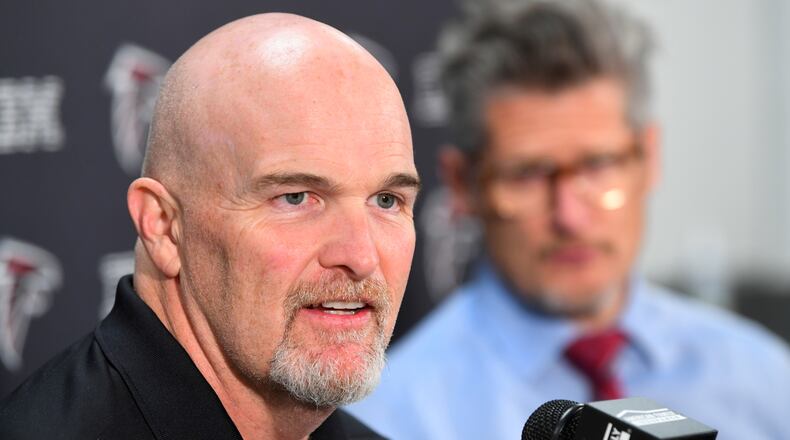Dan Quinn held a somber tone when reacting to the news that the Big Ten and Pac-12 were postponing their 2020 fall seasons with the possibility of playing in the spring.
Considering the 14-month scouting process NFL teams take to get to know players at the college level, Quinn showed empathy toward the players in conferences who won’t compete in the coming months. The Falcons head coach also appeared to offer support to those college players who would like to have at a louder voice at the table through unionization.
When it first appeared the 2020 college football season was at risk when Power 5 conferences began weighing postponements or cancelations, Clemson quarterback Trevor Lawrence posted a graphic on Twitter that stated his desire to not only play the 2020 season under safe conditions, but that the players be allowed to form a union in the form of a college football players’ association.
Given his experience as a former college assistant, Quinn, speaking to reporters during a virtual news conference Wednesday, was asked if he thinks college football players should be allowed to unionize and receive payment for play dictated by their market value. While Quinn didn’t answer whether players should be paid or not, he did seem to offer support for a union, in some fashion, at the collegiate level.
“I think, No. 1, a voice is good,” Quinn said. “Having the opportunity to express themselves as a group, that’s an important thing, especially for a young guy who is just coming up and trying to figure it out. None of us have all the answers. But creating space to have conversations, I think that’s a good start for the things they are deeming important to them. And then on the other side, obviously, listening. That’s such a big part of it.”
In 2017, Business Insider calculated a fair market value average for football players at the top-20 most profitable programs in the country. The publication came up an average market value of $163,087 per season for each college football player at a top-20 profitable institution. But since certain universities are more profitable than others, that fair market value number is much higher at a place like Texas, where each player is deemed to be worth $666,029. At Georgia, Business Insider determined each player’s fair market value at $463,536.
Since college football players are only compensated in the form of a college scholarship, they aren’t considered employees of the NCAA member institutions. But if college football players were considered employees and compensated, they could form a union and collectively bargain with universities in cases such as how best to return to play during a pandemic.
For instance, as numerous Big Ten players, including Ohio State quarterback Justin Fields, voiced their desire to play on social media, the conference still decided to postpone the fall season. Quinn said the college players should be a part of the discussion on such decisions.
“Maybe during this time they’ll be able to have some of those conversations amongst players and representatives from conferences, leagues and athletic directors,” Quinn said. “But having a voice together and expressing those opinions, it’s not easy to do as a young guy. Finding a way to do that, that’s a big deal.”
While the Big Ten and Pac-12 joined the Mountain West and MAC as conferences that won’t play in the fall, the Big 12, ACC, SEC, AAC, Conference USA and Sun Belt are still moving forward with the plans to play in September.
When it comes to the college conferences that won’t play, NFL teams could have a difficult time scouting draft-eligible players in what could otherwise be a make-or-break year for them.
Since Quinn became the Falcons’ head coach in 2015, Atlanta has drafted the following number of players in each of these Division 1 conferences:
- Pac-12: 8
- SEC: 7
- ACC: 6
- Mountain West: 5
- Big Ten: 3
- AAC: 3
- Sun Belt: 1
- Conference USA: 1
- Big 12: 0
- MAC: 0
When it comes to the Division I level, the Falcons have drafted 16 players in leagues that won’t operate this fall. At the FCS level, Atlanta has taken three players since 2015, with each of those conferences - Ivy, Pioneer and Big Sky - postponing play in the fall.
It should be nothing short of challenging for the Falcons, as well as any NFL team, when it comes to scouting college players who are unable to play this season.
“My first reaction is I was hurting for the coaches and players,” Quinn said. “The players are going to need their coaches’ help more than they ever have. As far as what comes next after that, we’ll figure that out. Is it spring time or not? I’m just kind of focused on the here and now with our club as it factors in with that.”
About the Author


